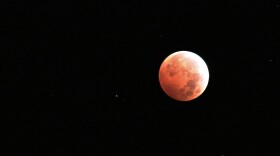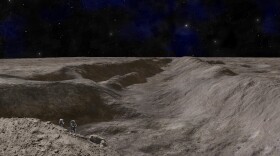-
If you look toward the eastern horizon just before dawn on a clear, moonless night, you should see a ghostly white glow shining up through the dark sky.
-
American culture was obsessed with Martians in the early 1900s. In a new book, bestselling author David Baron explains how this “alien craze” started with one astronomer in Flagstaff.
-
Scientists are using the Barringer Meteor Crater near Winslow to test equipment that might one day fly to the Moon.
-
Weather permitting, skywatchers in Arizona will be able to see a total lunar eclipse tonight — the first and only “blood moon” of the year.
-
During the past year, place names from the Grand Canyon have turned up on the surface of Mars. To find out why, author Scott Thybony sought out scientists from the Astrogeology Science Center in Flagstaff who’d been exploring the Martian surface.
-
A new study explains how two deep canyons formed very quickly on the moon during an asteroid impact. KNAU’s Melissa Sevigny spoke with local planetary scientist David Kring about the findings.
-
Flagstaff’s Lowell Observatory recently opened the long-awaited Marley Foundation Astronomy Discovery Center. Hundreds of visitors flocked to the new exhibits, which aim to connect people to the universe in unexpected ways.
-
Dr. Amanda Bosh has been appointed executive director of Flagstaff’s Lowell Observatory. She's set to start the new role on November 8.
-
NASA’s Webb Space Telescope has identified new clues about the surface of Pluto’s largest moon, Charon.
-
It's been nearly two decades since astronomers voted on the definition of a planet and demoted Pluto. Some scientists are still unhappy with the decision, and a group in California recently proposed a new definition. Gerard van Belle of Lowell Observatory says the proposal falls short for Pluto fans but has reignited the debate.

Play Live Radio
Next Up:
0:00
0:00
Available On Air Stations










